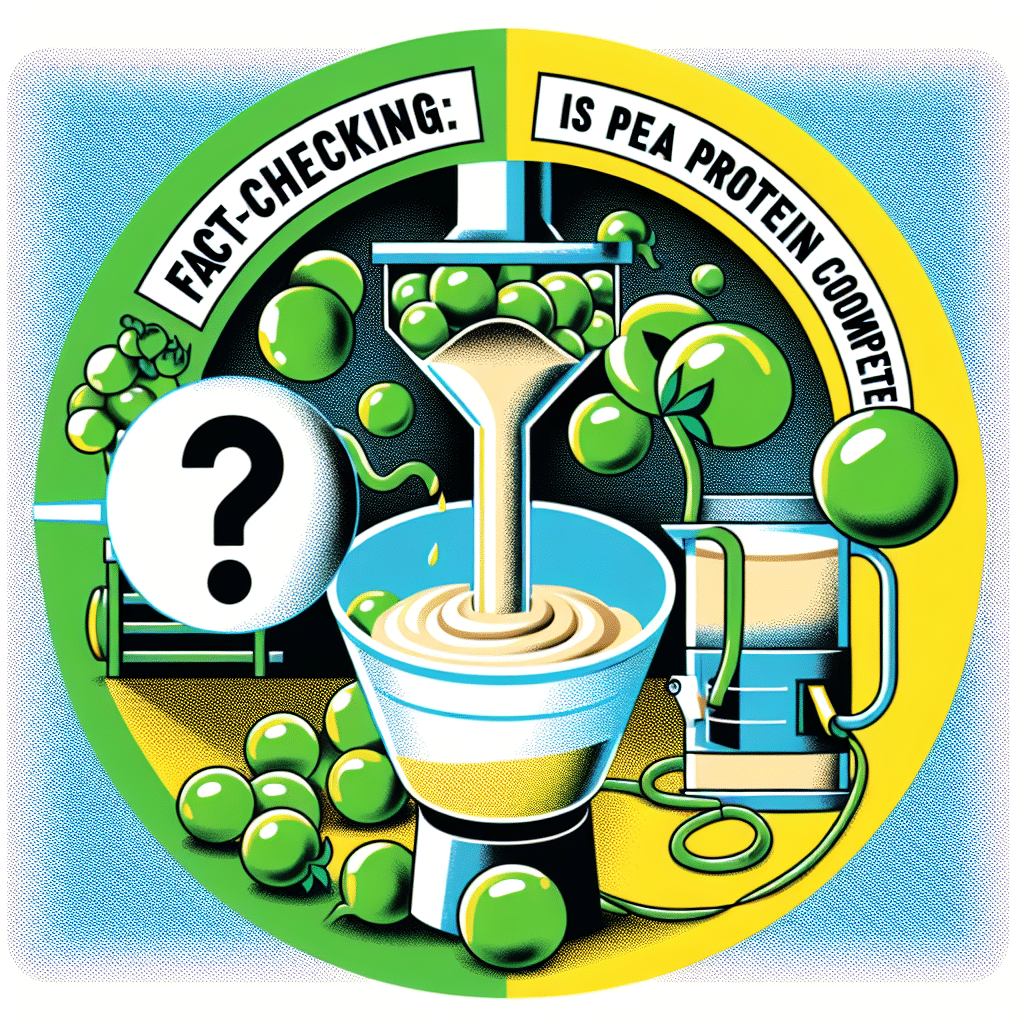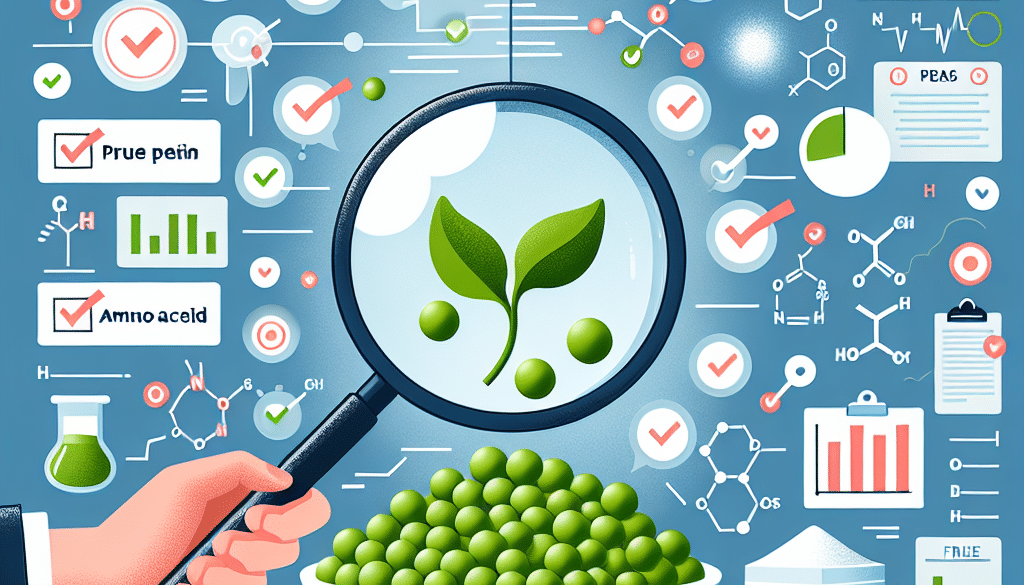Is Pea Protein Not Complete: Fact-Checking
-
Table of Contents
Is Pea Protein Not Complete: Fact-Checking

Pea protein has gained significant popularity in recent years as a plant-based alternative to animal-based protein sources. It is often touted as a complete protein, meaning it contains all nine essential amino acids that the body needs for optimal health. However, there have been claims suggesting that pea protein is not actually complete. In this article, we will fact-check these claims and provide valuable insights into the nutritional profile of pea protein.
The Nutritional Profile of Pea Protein
Before diving into the completeness of pea protein, let’s first understand its nutritional profile. Pea protein is derived from yellow peas and is a rich source of protein, fiber, and various vitamins and minerals. It is also low in fat and cholesterol-free, making it an excellent choice for individuals looking to maintain a healthy diet.
Pea protein is particularly known for its high protein content. It typically contains around 80-90% protein by weight, making it comparable to other popular protein sources like whey and soy. Additionally, pea protein is easily digestible and hypoallergenic, making it suitable for individuals with dietary restrictions or sensitivities.
The Myth of Incomplete Protein
One of the main arguments against pea protein’s completeness is its relatively low content of methionine, an essential amino acid. Methionine is often considered the limiting amino acid in plant-based proteins, as it is present in lower quantities compared to animal-based proteins.
However, it is important to note that the concept of “limiting amino acids” is based on the idea that all essential amino acids must be present in equal proportions for a protein to be considered complete. This concept has been debunked by scientific research, which has shown that the body can efficiently utilize amino acids from different protein sources throughout the day to meet its needs.
In fact, the World Health Organization (WHO) and the Food and Agriculture Organization (FAO) have revised their protein quality evaluation methods to reflect this understanding. They now use the Protein Digestibility-Corrected Amino Acid Score (PDCAAS) and the Digestible Indispensable Amino Acid Score (DIAAS) to assess protein quality, taking into account the digestibility and amino acid composition of the protein.
Pea protein has been found to have a PDCAAS score of 0.89, which is considered high and comparable to other plant-based proteins like soy protein. This score indicates that pea protein provides a sufficient amount of essential amino acids for the body’s needs.
Complementary Protein Sources
While pea protein is indeed a complete protein, it is true that it is relatively low in methionine compared to animal-based proteins. However, this does not mean that individuals relying solely on pea protein for their protein needs will be deficient in methionine.
By combining pea protein with other plant-based protein sources that are rich in methionine, such as rice protein or hemp protein, individuals can easily obtain a well-rounded amino acid profile. This concept of combining complementary protein sources is known as protein complementation and has been widely accepted as an effective way to meet the body’s amino acid requirements.
For example, a study published in the Journal of Agricultural and Food Chemistry found that combining pea protein with rice protein resulted in a protein blend with a higher PDCAAS score than either protein alone. This demonstrates the synergistic effect of combining different plant-based protein sources to enhance protein quality.
The Benefits of Pea Protein
Pea protein offers numerous benefits that make it an attractive choice for individuals seeking a plant-based protein source. Some of these benefits include:
- High protein content: Pea protein is a concentrated source of protein, making it an excellent choice for individuals looking to increase their protein intake.
- Easy digestion: Pea protein is easily digestible and gentle on the stomach, making it suitable for individuals with digestive sensitivities.
- Hypoallergenic: Pea protein is free from common allergens like dairy, soy, and gluten, making it a safe option for individuals with food allergies or intolerances.
- Sustainable and eco-friendly: Pea protein production has a lower environmental impact compared to animal-based protein sources, making it a more sustainable choice.
Summary
Contrary to the claims suggesting that pea protein is not complete, scientific research and protein quality evaluation methods support the notion that pea protein is indeed a complete protein. While it may be relatively low in methionine compared to animal-based proteins, this can be easily addressed by combining pea protein with other plant-based protein sources. Pea protein offers numerous benefits and is a valuable addition to a balanced and sustainable diet.
About ETprotein
ETprotein, a reputable protein Chinese factory manufacturer and supplier, is renowned for producing, stocking, exporting, and delivering the highest quality organic bulk vegan protein and plant proteins. They include Organic rice protein, clear rice protein, pea protein, clear pea protein, pumpkin seed protein, sunflower seed protein, mung bean protein, etc. Our offerings, characterized by a neutral taste, non-GMO, allergen-free attributes, cater to a diverse range of industries. We serve nutraceutical, pharmaceutical, cosmeceutical, veterinary, as well as food and beverage finished product distributors, traders, and manufacturers across Europe, USA, Canada, Australia, Thailand, Japan, Korea, Brazil, and Chile, among others.
Our specialization includes exporting and delivering tailor-made protein powder and finished nutritional supplements. Our extensive product range covers sectors like Food and Beverage, Sports Nutrition, Weight Management, Dietary Supplements, Health and Wellness Products, and Infant Formula, ensuring comprehensive solutions to meet all your protein needs.
As a trusted company by leading global food and beverage brands and Fortune 500 companies, ETprotein reinforces China’s reputation in the global arena. For more information or to sample our products, please contact us and email sales(at)ETprotein.com today.












